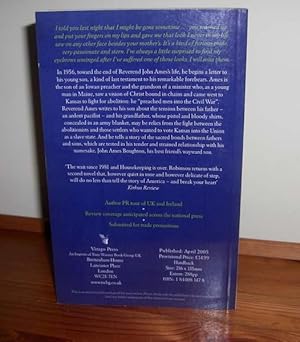
You wouldn’t be far wrong if you said that the whole novel is an account of the power and beauty of blessing. And there is plenty here for theologians to think about as well. It’s a narrative of fragile beauties, luminous insights, mysterious silences – all related in a prose as spare and understated as the dustbowl town itself. (In a lecture, Hauerwas describes this as “the first Barthian novel” – a fine description, except that John Updike has been writing “Barthian novels” for decades!) I recommend it especially if you are religious and Christian, or grappling with age or mortality.Prompted by recommendations from both Kim Fabricius and Stanley Hauerwas, I finally got around to reading Marilynne Robinson’s Gilead (New York: Farrar, 2004), an exquisite portrayal of three (or four) generations of preachers in a decrepit little town in Iowa. Still, there’s no denying that this book is beautiful and incredibly impressive, and I’m glad I read it. I understand and absolutely admire the craft here, the portrait of a man grappling with the prospect of his death, coming to terms with it, finding his way to calm when it comes to the grudges he’s held in the past. I just wasn’t necessarily interested in the things that interested John Ames. In the middle of the novel, though, I found myself a wishing it would move along faster.

They drew me in and really tugged at my heart. I really loved the beginning and the ending of this novel. Along the way, he also narrates what’s happening in the current moment with his good friend and his friend’s son, who has returned to town following a questionable past. He starts a sort of diary to tell his son all the things he’ll never get to tell him in person, including the history of his grandfather, who was a free soiler in Kansas, and his father.

He is an elderly protestant minister who married late, has a young son, and recently learned that his heart is failing. Gilead is an epistolary novel, “written by” the main character, John Ames. Beautiful prose, a bit cerebral, touching subject matter. Gilead did win the Pulitzer, though, and it certainly reads like a Pulitzer winner. I ready Gilead because it’s the prerequisite to Home, which won the Women’s Prize in 2009, and I’m working my way through all the past Women’s Prize winners. You may not remember me very well at all, and it may seem to you to be no great thing to have been the good child of an old man in a shabby little town you will no doubt leave behind. I’m writing this in part to tell you that if you ever wonder what you’ve done in your life, and everyone does wonder sooner or later, you have been God’s grace to me, a miracle, something more than a miracle. It still amazes me every time I think of it. “I’d never have believed I’d see a wife of mine doting on a child of mine.


 0 kommentar(er)
0 kommentar(er)
